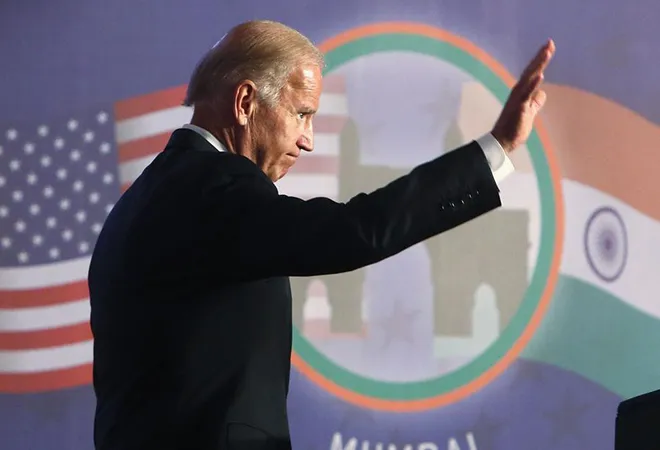
Democratic presidential nominee and former Vice President Joe Biden has deemed President Donald Trump to have “abdicated American leadership”. In contrast, the Biden campaign has construed their candidate as someone who would restore America’s place “back at the head of the table.” As with his promise to “return to normalcy” on the domestic front, Biden’s foreign policy agenda also seems to be “looking at an across-the-board restoration project”. This includes invocation of familiar themes over the indispensable nature of US leadership and an expansive scope of threats facing America.
From the standpoint of US-India ties, if Biden wins, he would be the third US president that Prime Minister Narendra Modi would do business with. However, in addition to Biden’s time as Barack Obama’s vice president, he is seen as an old hand on Washington’s relations with New Delhi given his experience as chairman of the Senate Foreign Relations Committee during the passage of the US-India Civil Nuclear Agreement in 2008, and as the co-sponsor of a legislation (Naval Vessels Transfer Act of 2005) which led to India’s acquisition of the first US-built warship.
However, some commentators have warned of impending challenges under a Biden presidency owing to the Democrats’ heightened focus on defending values through America’s foreign policy.
Preservationist or reformist Capitol Hill?
At the October 2019 House Foreign Affairs Committee hearing on human rights in South Asia, Democrats rallied against Trump’s ambivalence towards the Modi government’s abrogation of Article 370 in Kashmir and the communications lockdown that followed. Whereas, Republicans sought to temper criticism by making a case against Washington’s “high standards” on human rights — in-line with Trump’s idea of “divorcing” foreign policy from values, and some even called for the Modi government’s actions to be “applauded”. This partisan divergence on India stood compounded with the US-India dynamic being subject to politicisation from either sides. Cases in-point being, optics of Modi seeming to endorse Trump’s reelection at the ‘Howdy, Modi!’ rally (New Delhi has denied this), and the use of Modi’s speech at the ‘Namaste, Trump!’ event in Trump’s campaign advertisement aimed at courting the Indian American electorate (see here).
Going forward, if a Democrat-controlled US Congress (given reports of their probability of taking over the US Senate) views US-India ties to have been politicised to the further detriment of shared values, their criticisms may be employed as a means to spur a change in behaviour.
Under Trump, a bipartisan effort to preserve some tenets of American internationalism against ‘America First’ impulses has been prevalent. However, following the 2018 midterms which led to a Democratic majority in the US House of Representatives, an effort to project an American foreign policy that ought-to-be also emerged. This included, increased scrutiny of Trump’s foreign policy owing to the House’s oversight powers (as with hearings on Trump’s Syria policy), contrasting Trump’s support for populism abroad (as with Democrats declaring their opposition to a no-deal Brexit threatening the Good Friday Agreement), and pushing a focus on human rights issues (as with mandating Trump to act on Chinese actions in Xinjiang, Tibet, and Honk Kong).
Under Biden, a Democrat-led House and Senate may not play such a preservationist role. Instead, it could seek to reform Biden’s foreign policy as commentators warn against his return to “a narrow Washington consensus that has failed our country and the world.” Although this may not occur in Biden’s initial years as pressing domestic agendas would take precedence, such a role can be imagined in view of the reported trend of progressives — that view Biden as a “man of the past" due to his promise of a restorationist foreign policy, ousting Democrat establishment incumbents in Congressional primaries this year.
In case of US-India ties, this could include invocation of Congressional authority to link the confirmation of envoys or clearance of arms sales to the Biden administration’s commitment to press New Delhi on issues over civil-liberties. One may argue, the prospect of this occurring would be in the long-shot of concerns eclipsing the many strategic convergences between New Delhi and Washington. However, a lot may depend on the Democrats’ evolving characterisation of the Modi dispensation — which some progressive legislators have already alleged of spreading “violent Hindu nationalism and hate crimes against Muslims.”
Moreover, in a sign of such voices already having considerable sway over Biden, recently, his campaign’s ‘Agenda for Muslim-American Communities’ noted the situation in Kashmir alongside references to the internment of Uyghurs in China and atrocities against Rohingyas in Myanmar, as instances that “pain” Muslim-Americans. Thereafter, following an uproar by other sections of the Indian American community, the Biden campaign underscored its vision for US-India ties.
Continuity on US-India ties under Biden
Speaking at an event on India’s Independence Day, Biden said India and the US “share a special bond that I’ve seen deepen over many years.” His campaign also announced, “Biden will deliver on his long-standing belief that India and the United States are natural partners, and a Biden administration will place a high priority on continuing to strengthen the US-India relationship.” Biden’s campaign also released its ‘Agenda for the Indian American Community’, which is reportedly the first-ever such policy paper by a presidential campaign. Wherein, in a sign of policy continuity, it invoked the Trump administration’s Indo-Pacific construct to underscore Biden’s commitment to “work with India to support a rules-based and stable Indo-Pacific region in which no country, including China, is able to threaten its neighbors with impunity."
Furthermore, it hailed the Obama-Biden years’ record of supporting New Delhi’s capacity-building with the Major Defense Partner (MDP) designation in order “to ensure that when it comes to the advanced and sensitive technology that India needs to strengthen its military, India is treated on par with our closest partners.” Biden’s support on this front would also constitute a point of continuity, given the Trump administration’s record of not only continuing the MDP designation but also furthering the same with its classification of India under the Strategic Trade Authorisation-1 category and finalising the Industrial Security Annex to facilitate transfer of sensitive technologies.
In addition, under Biden’s ‘normal’ foreign policy, one can expect a dampening of trade tensions that have come to mar bilateral ties under Trump. Although Biden has criticised Trump’s approach of levying tariffs as “alienating our allies and undermining the power of our collective leverage”, pressure to continue negotiations on India’s tariff/non-tariff barriers would likely persist. However, the Biden administration would differ in terms of not having such divergences play out in the open — in-line with the Obama administration's ‘Carter mantra’ which dictated harnessing of strategic convergences without allowing differences to crowd out “minimal-yet-positive developments.”
However, US apprehensions over India’s ties with Russia could reemerge. Although the main scope of Democrats’ criticism of the Vladimir Putin regime remains to be election interference, Biden has also criticised Moscow’s use of Western financial institutions. In hinting at the possibility of US retaliation in this realm under a Biden presidency, prospects of India facing US sanctions under the Countering America's Adversaries Through Sanctions Act could reignite. Although Trump has not accorded a waiver to New Delhi as per the provisions passed under Section 231 of the legislation, his administration has also not come down hard on India as in case of Turkey, for instance. Under a Biden presidency, questions over continuity on this ‘tacit waiver’ could assume the fore. Moreover, even if Biden were to pursue constructive ties with Russia on pressing matters like extending the New START treaty — a key foreign policy win of the Obama-Biden years, which expires in February 2021, a progressive US Congress could force his administration to get tough on Moscow on other avenues, such as its international dealings.
Certainly, it would be unfair to say that Biden would entirely remain beholden to power balances on the Capitol Hill, especially since foreign policy is mostly a domain of the executive branch under the “wide array of associated or “implied” powers” of Article II of the US Constitution. Hence, for instance, the trajectory of US-India counterterrorism cooperation or even the future of the QUAD with US-India defence interoperability at its core — two avenues that would interestingly also constitute points of continuity with Trump, would largely be animated by the Biden administration.
However, on other promises like Biden’s announced plan to reform the H-1B visa system and eliminate the limits on employment-based green cards by country, the role of the US Congress cannot be understated. Biden’s plan to “protect American and foreign workers alike” to ensure that “employers are not taking advantage of immigrant workers” which leads to undercutting of native-born workers on wages and opportunities, would require a comprehensive legislative undertaking to institute parity in wage levels. Moreover, against the backdrop of a downturn in the US economy and rise in unemployment due to the coronavirus pandemic, even if Democrats were to gain a comfortable majority in both chambers of the US Congress, odds of them spending their post-election political capital on Biden’s plan for foreign workers would be slim.
Hence, although Biden has invoked Trump’s Indo-Pacific construct to promise continuity on US-India ties, the US Congress’ shift to a reformist — from its current preservationist, role could pose challenges.
The views expressed above belong to the author(s). ORF research and analyses now available on Telegram! Click here to access our curated content — blogs, longforms and interviews.




 PREV
PREV


